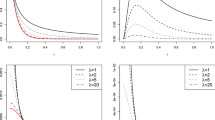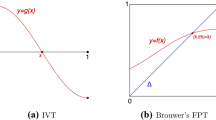Abstract
We approximate the white-noise driven stochastic heat equation by replacing the fractional Laplacian by the generator of a discrete time random walk on the one dimensional lattice, and approximating white noise by a collection of i.i.d. mean zero random variables. As a consequence, we give an alternative proof of the weak convergence of the scaled partition function of directed polymers in the intermediate disorder regime, to the stochastic heat equation; an advantage of the proof is that it gives the convergence of all moments.
Similar content being viewed by others
References
Alberts, T., Khanin, K., Quastel, J.: The intermediate disorder regime for directed polymers in dimension \(1+1\). Ann. Probab. 42(3), 1212–1256 (2014)
Balázs, M., Rassoul-Agha, F., Seppäläinen, T.: The random average process and random walk in a space–time random environment in one dimension. Commun. Math. Phys. 266, 499–545 (2006)
Borovkov, A.A.: On the rate of convergence for the invariance principle. Theory Probab. Appl. 18, 207–225 (1973)
Caravenna, F., Sun, R., Zygouras, N.: Polynomial chaos and scaling limits of disordered systems. J. Eur. Math. Soc. (JEMS) 19(1), 1–65 (2017)
Chen, L., Dalang, R.C.: Moments, intermittency and growth indices for the nonlinear fractional stochastic heat equation. Stoch. Partial Differ. Equ. Anal. Comput. 3(3), 360–397 (2015)
Comets, F.: Directed polymers in random environments. Volume 2175 of Lecture Notes in Mathematics. Springer, Cham, 2017. Lecture notes from the 46th Probability Summer School Held in Saint-Flour (2016)
Comets, F., Yoshida, N.: Directed polymers in random environment are diffusive at weak disorder. Ann. Probab. 34(5), 1746–1770 (2006)
Conus, D., Joseph, M., Khoshnevisan, D., Shiu, S.-Y.: On the chaotic character of the stochastic heat equation, II. Probab. Theory Relat. Fields 156(3–4), 483–533 (2013)
Corwin, I.: The Kardar–Parisi–Zhang equation and universality class. Random Matrices Theory Appl. 1(1), 1130001 (2012)
den Hollander, F.: Random polymers. Volume 1974 of Lecture Notes in Mathematics. Springer, Berlin, 2009. Lectures from the 37th Probability Summer School Held in Saint-Flour (2007)
Durrett, R.: Probability: Theory and Examples. Cambridge Series in Statistical and Probabilistic Mathematics, 4th edn. Cambridge University Press, Cambridge (2010)
Èbralidze, Š.S.: Inequalities for probabilities of large deviations in the multidimensional case. Theory Probab. Appl. 16, 733–741 (1971)
Foondun, M., Joseph, M., Li, S.-T.: An approximation result for a class of stochastic heat equations with colored noise. arXiv:1611.06829
Foondun, M., Khoshnevisan, D.: Intermittence and nonlinear parabolic stochastic partial differential equations. Electron. J. Probab. 14(21), 548–568 (2009)
Foondun, M., Khoshnevisan, D.: An asymptotic theory for randomly forced discrete nonlinear heat equations. Bernoulli 18(3), 1042–1060 (2012)
Funaki, T.: Random motion of strings and related stochastic evolution equations. Nagoya Math. J. 89, 129–193 (1983)
Gnedenko, B.V., Kolmogorov, A.N.: Limit Distributions for Sums of Independent Random Variables. Addison-Wesley Publishing Company Inc, Cambridge, Translated and annotated by K. L. Chung. With an Appendix by J. L. Doob (1954)
Gyöngy, I.: Lattice approximations for stochastic quasi-linear parabolic partial differential equations driven by space–time white noise I. Potential Anal. 9(1), 1–25 (1998)
Gyöngy, I.: Lattice approximations for stochastic quasi-linear parabolic partial differential equations driven by space–time white noise II. Potential Anal. 11(1), 1–37 (1999)
Heyde, C.C.: On large deviation probabilities in the case of attraction to a non-normal stable law. Sankhyā Ser. A 30, 253–258 (1968)
Joseph, M., Khoshnevisan, D., Mueller, C.: Strong invariance and noise-comparison principles for some parabolic stochastic PDEs. Ann. Probab. 45(1), 377–403 (2017)
Kanagawa, S.: The rate of convergence for approximate solutions of stochastic differential equations. Tokyo J. Math. 12(1), 33–48 (1989)
Kolokoltsov, V.: Symmetric stable laws and stable-like jump-diffusions. Proc. Lond. Math. Soc. (3) 80(3), 725–768 (2000)
Kumar, R.: Space–time current process for independent random walks in one dimension. ALEA Lat. Am. J Probab. Math. Stat. 4, 307–336 (2008)
Nagaev, S.V.: Large deviations of sums of independent random variables. Ann. Probab. 7(5), 745–789 (1979)
Osipov, L.V.: Asymptotic expansions in the central limit theorem. Vestnik Leningrad. Univ. 22(19), 45–62 (1967)
Seppäläinen, T., Zhai, Y.: Hammersley’s harness process: invariant distributions and height fluctuations. Ann. Inst. Henri Poincaré Probab. Stat. 53(1), 287–321 (2017)
Spitzer, F.: Principles of Random Walks, 2nd edn. Springer, New York (1976). Graduate Texts in Mathematics, Vol. 34
Acknowledgements
The author thanks the referee for a careful reading of the paper and for several comments. He expresses his gratitude to Davar Khoshnevisan for providing the proof of Lemma 3.3. He also thanks David Applebaum and Timo Seppäläinen for comments on an earlier version of the paper. This work was done while the author was at the University of Sheffield, and he thanks the School of Mathematics and Statistics for a supportive environment. Partial support from the Engineering and Physical Sciences Research Council (EPSRC) through Grant EP/N028457/1 is gratefully acknowledged.
Author information
Authors and Affiliations
Corresponding author
Appendices
Appendix: A local limit theorem
The following local limit theorem is a modification of Proposition 3.3 in [13]. Below \(p_t\) is the density for the Stable(\(\alpha \)) process with generator \(-\nu (-\Delta )^{\alpha /2}\).
Theorem A.1
Suppose Assumption 1.1 holds. Then for any \(0\leqslant b\leqslant 1\) and any \(c>0\)
uniformly for \(1/n\leqslant t\leqslant T\).
Proof
To simplify notation we denote \(\tilde{t}=[nt]/n\). We first bound the expression on the left for \(x=k-\mu [nt]\). Fourier inversion gives
and
Therefore
The first term can be bound just as term \(I_2\) in Proposition 3.3 of [13], and we get
For the second term we split the region of integration depending on whether or not z is in
Our assumptions on the characteristic function \(\phi \) imply
on \(|z|\leqslant \pi n^{1/\alpha }\), and so it follows as in [13] that
We next need to consider the above integrand over the region \(z \in A_{t,n}\). First observe
It is easy to see that \([nt]\mathcal {D}\big (z/n^{1/\alpha }\big )\) is bounded on \(A_{t,n}\), and so
We thus have the required bound in the case \(x=k-\mu [nt]\). In the case of a general x such that \(|x-(k-\mu [nt])|\leqslant n^{(1-b)/\alpha }\) we have
This completes the proof. \(\square \)
The local limit theorem has the following consequence.
Corollary A.2
Let Assumption 1.1 hold. Suppose \(a_n\) is an integer valued sequence such that
as \(n \rightarrow \infty \) for some constant a. Then for fixed \(t>0\)
Proof
We write
Use the scaling property: for any \(c>0\)
to write the above as
The rest is a Riemann sum approximation. \(\square \)
Appendix: Bounds required for Proposition 3.5
The main results of this section are Lemmas B.4 and B.5 which were needed in the proof of Proposition 3.5.
Lemma B.1
The following holds
Proof
The first inequality is a simple consequence of the fact that
for any w, since the characteristic function of \(Y_j\) is \(\vert \phi (z)\vert ^{2j}\). As for the finiteness of the sum observe that \(P(Y_j=0)\) is decreasing with j and therefore
the last inequality following from (2.7). \(\square \)
It follows from Assumption 1.1 on the characteristic function that the distributions function F(x) of \(X_1\) belongs to the domain of normal attraction of the symmetric stable law with exponent \(\alpha \) (see section 35 of [17]). This means that one has to scale the centered \(X_n-\mu n\) by a constant multiple of \(n^{1/\alpha }\). One can characterize such distribution functions.
Lemma B.2
([17]) A necessary and sufficient condition for F to be in the domain of normal attraction of a Stable(\(\alpha \)) law, \(0<\alpha <2\), is the existence of contants \( c_1,c_2\geqslant 0,\, c_1+c_2>0\) such that
where the functions \(f_1\) and \(f_2\) satisfy
We use the above lemma to deduce the following large deviation estimate.
Lemma B.3
There exists a constant \(c_3>0\) such that
Proof
For \(1<\alpha <2\) we use the result in [20]. This gives for \(c_3>|\mu |\)
from the previous lemma. For \(\alpha =2\), one can use Exercise 3.3.19 in [11] to conclude that \(X_1\) has second moments. One then uses Chebyschev’s inequality to prove the lemma. \(\square \)
For the rest of this section we provide the proofs of the bounds required for the two terms in (3.14). Below is the bound on the first term.
Lemma B.4
The first term in (3.14) has the bound
where the limits of the summation are as in (3.12).
Proof
We write
the equality holding by an application of the Markov property. We focus on the second term for now, we will return to the first term later. We split the sum according to whether \(i=0\) or not. The \(i=0\) term is of order \(n^{\theta }n^{-(\alpha -1)/\alpha }\). For the term corresponding to \(i\geqslant 1\) replace \(\tilde{X}_{i[n^\theta ]} = k[n^\gamma ]\) by \(\tilde{X}_{i[n^\theta ]}=l\) by using Theorem A.1 with \(b=1-\alpha \gamma \) to obtain
Returning to our expression (B.1) we now can write it as
where we have used Lemma B.1 and Lemma B.3 with the constant \(c_3\) from there. Let us now consider each of the first two terms above. Using Theorem A.1 as well as (A.2) one gets for the first term
where \(\tilde{p}_1(\cdot )\) is the transition kernel of \(-2\nu (-\Delta )^{\alpha /2}\). Using Theorem A.1 again with \(b=1-\alpha \theta \), we get for \(|w|\leqslant c_3n^\theta \)
Collecting all our estimates and recalling our conditions (3.2) on \(\gamma \) and \(\theta \) completes the proof. \(\square \)
We next bound the second term in (3.14).
Lemma B.5
The second term in (3.14) has the bound
where the limits in the summation are as in (3.14).
Proof
We separate out the \(i=0\) term and obtain
The reason for the error bound for the first term is that restricting \(i=0\) forces \(k=0\), and the number of terms in the summation over j and l is of order \(n^{\theta +\gamma }\). As in Lemma B.4 we split the sum over w according to whether \(|w|\leqslant c_3[n^\theta ]\) or not. In the case \(|w|\leqslant c_3[n^\theta ]\) we use Theorem A.1 with \(b=1-\alpha \theta \). Thus the above is
To bound the last term we ignore the difference in the expression and instead bound the sum. By Lemmas B.1 and B.3
and
where we used Lemma B.1 in the last step. Collecting our estimates completes the proof. \(\square \)
Rights and permissions
About this article
Cite this article
Joseph, M. An invariance principle for the stochastic heat equation. Stoch PDE: Anal Comp 6, 690–745 (2018). https://doi.org/10.1007/s40072-018-0118-9
Received:
Published:
Issue Date:
DOI: https://doi.org/10.1007/s40072-018-0118-9




